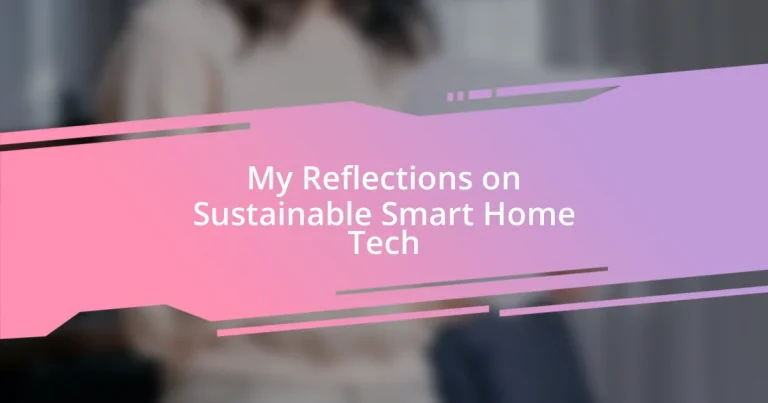Key takeaways:
- Sustainable smart homes combine technology and eco-friendliness, promoting energy efficiency and reducing carbon footprints through smart devices and renewable energy resources.
- Benefits of smart home technology include energy efficiency, enhanced security, convenience, increased home value, and a positive environmental impact.
- Monitoring energy consumption with smart technology fosters awareness and collective efforts towards sustainability, leading to reduced energy bills and a more mindful lifestyle.
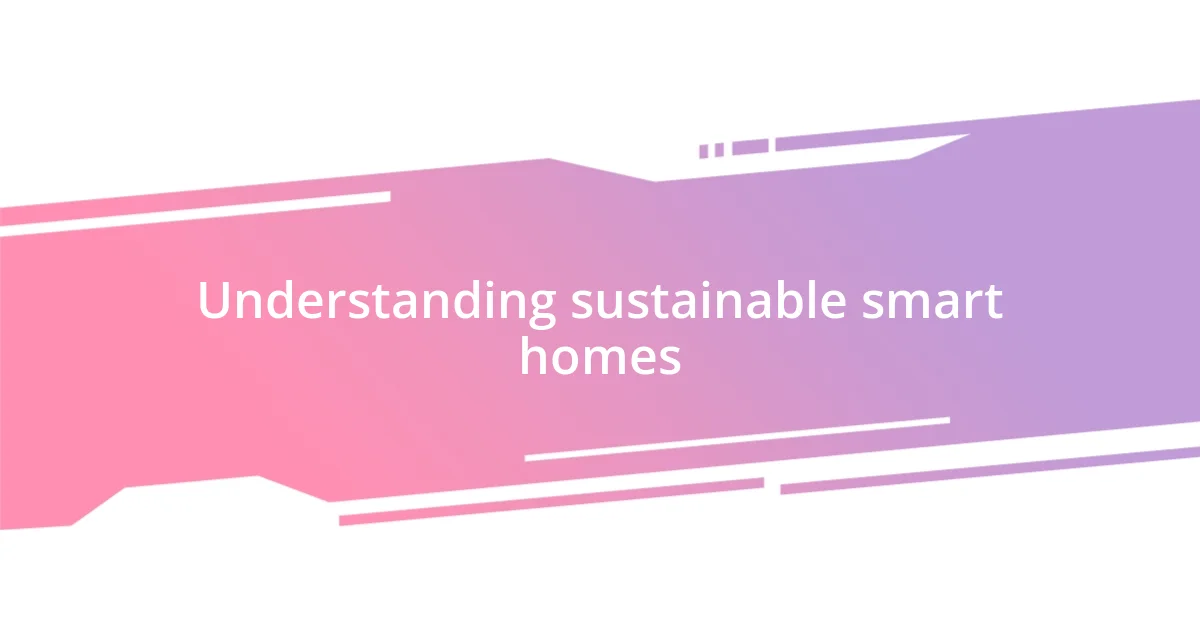
Understanding sustainable smart homes
Sustainable smart homes represent a fusion of technology and eco-friendliness, offering innovative solutions to reduce our carbon footprint while enhancing our everyday lives. I remember the thrill of installing my first smart thermostat; watching it learn my habits and adjust accordingly made me feel like I was actively contributing to energy conservation. Isn’t it exciting to think that with every small change we make, like this, we can significantly impact the environment?
At its core, sustainability in smart homes means utilizing energy-efficient devices, renewable energy resources, and intelligent systems that adapt to our lifestyle. For example, I once visited a friend whose home operated on solar power, and their energy bills were practically nonexistent. How liberating is that—to harness the sun’s energy and use it to power your everyday life?
Moreover, understanding how these technologies work can empower us to make informed decisions. I often find myself questioning whether my current tech choices are truly sustainable. It’s a thought-provoking journey, diving deep into the features and implications of smart home tech. After all, embracing this innovation is not just about convenience; it’s about creating a healthier planet for future generations.
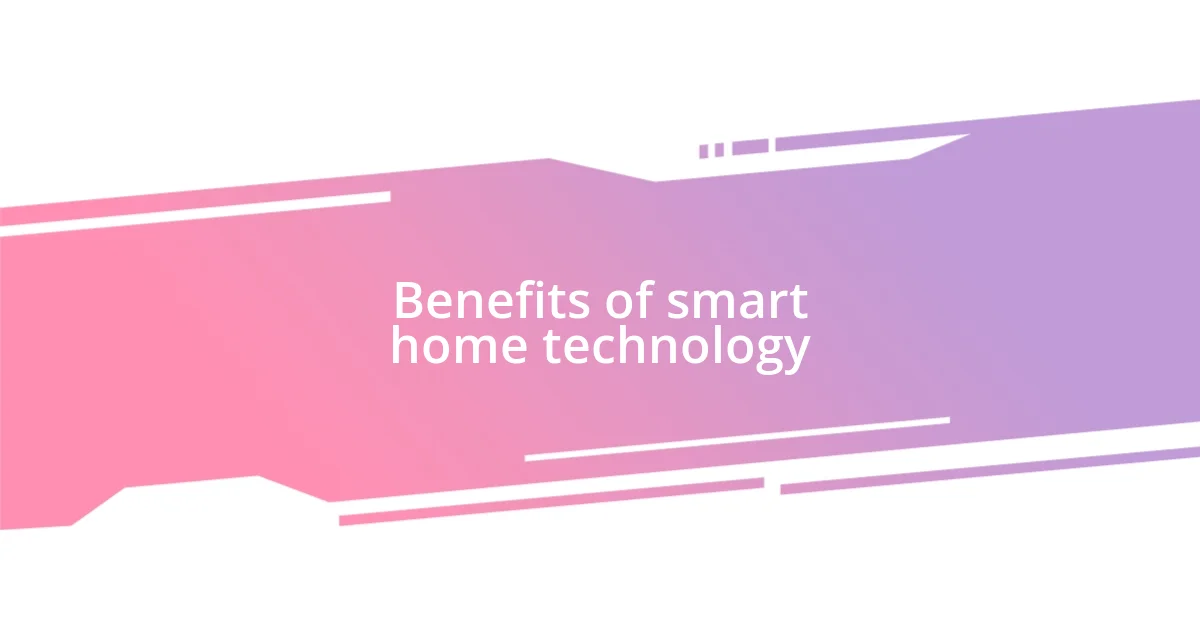
Benefits of smart home technology
Integrating smart home technology into our lives offers numerous benefits that can genuinely enhance our daily experiences. I vividly recall when I first installed smart lights that could adjust their brightness based on the time of day. It transformed my space, creating cozy atmospheres in the evenings. Not only that, but I also found myself saving money on my electricity bills, which made me appreciate the financial benefits as much as the convenience.
Here are some key advantages of smart home technology:
- Energy Efficiency: Automated systems optimize energy consumption, leading to lower utility bills.
- Enhanced Security: Smart cameras and alarm systems provide peace of mind by allowing homeowners to monitor their property remotely.
- Convenience: Voice-activated devices and smart assistants streamline daily tasks, making life easier in countless ways.
- Increased Home Value: Homes equipped with smart technology often attract higher resale prices.
- Environmental Impact: By using resources more efficiently, smart homes contribute to reducing carbon footprints.
Reflecting on these benefits, I feel an overwhelming sense of optimism about how technology can work for us while respecting our planet. Just last weekend, I utilized my smart irrigation system, which adjusted watering based on the rain forecast. It felt good knowing that I wasn’t just ensuring my garden thrived, but also conserving water during a time of drought.
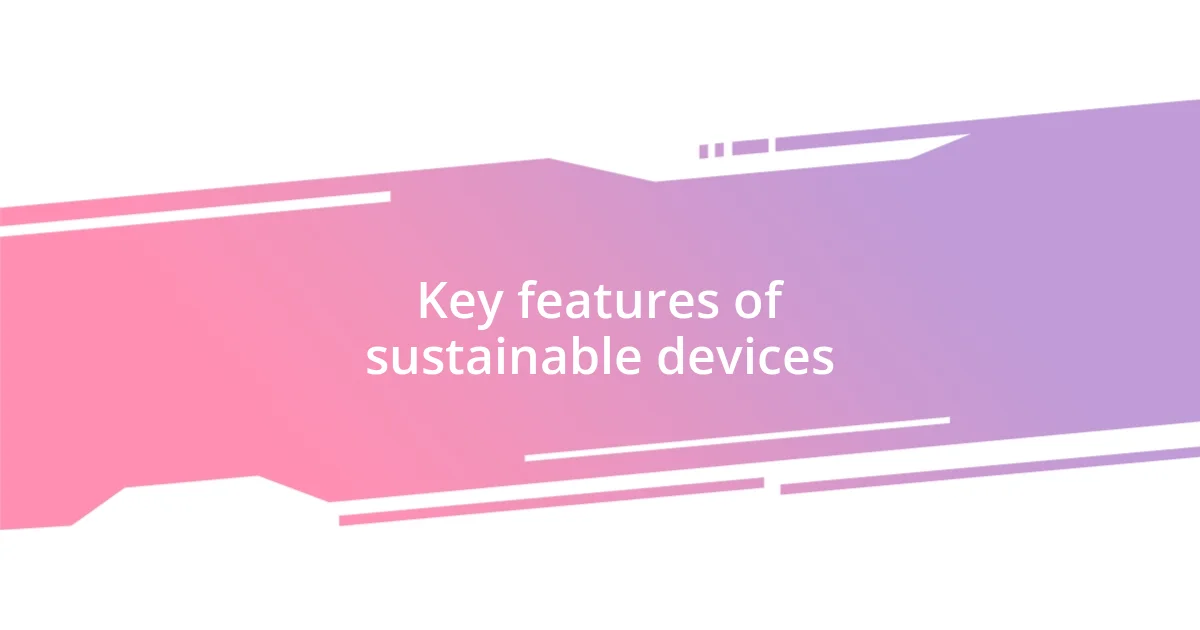
Key features of sustainable devices
Sustainable devices share several key features that set them apart from traditional technology. One standout aspect is energy efficiency. I remember being astonished when I switched to LED bulbs; they used a fraction of the energy of incandescent ones and lasted far longer. This change not only brightened my home but also led to a noticeable dip in my electricity bill. This experience underlines how little adjustments in our everyday choices can lead to significant financial and environmental benefits.
Another critical feature is the ability to integrate with renewable energy sources. When I installed solar panels, the connection with my smart home system allowed real-time monitoring of energy production and consumption. Witnessing this synergy in action was exhilarating, as I could see firsthand how my choices contributed to a more sustainable lifestyle. Setting up a battery storage system further amplified the effectiveness of this integration. Isn’t it incredible how we can harness nature’s power and apply it intelligently within our homes?
Moreover, the adaptability of smart devices plays a significant role in their sustainability. I was pleasantly surprised when my smart thermostat adjusted automatically based on my daily routine. It’s as if it had a personality of its own, learning what I needed and optimizing my energy use without me even thinking about it. This kind of responsive technology is not just convenient; it also encourages a more sustainable way of living, as it minimizes waste and maximizes efficiency.
| Feature | Description |
|---|---|
| Energy Efficiency | Uses less energy and reduces utility bills. |
| Integration with Renewables | Connects with solar or wind energy sources for real-time monitoring. |
| Adaptability | Learns user habits to optimize energy use automatically. |
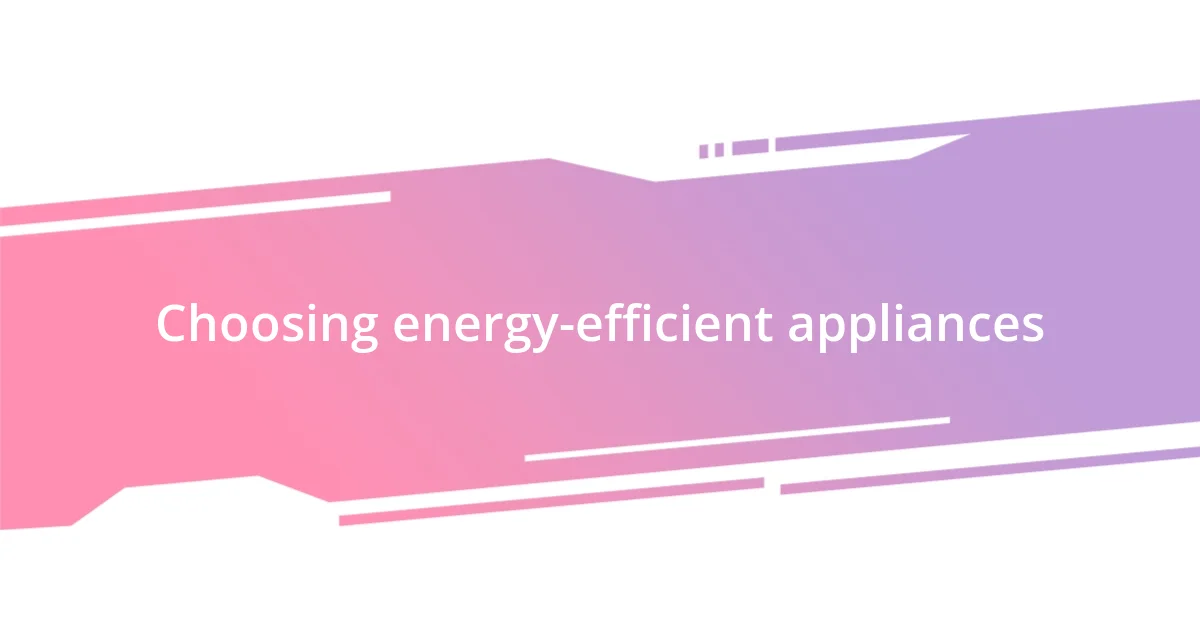
Choosing energy-efficient appliances
Choosing energy-efficient appliances can feel like a small decision, but the impact on both my wallet and the environment has been significant. I recall the day I swapped out my old refrigerator for an ENERGY STAR® certified model. Not only does it help reduce my energy consumption, but it also keeps my food fresher, allowing me to waste less. Isn’t it remarkable how a single appliance can make such a difference?
When selecting new appliances, I always look for those with smart features. For instance, my newer washing machine offers a setting that adjusts the water level based on the load size. The first time I used it, I couldn’t believe how much less water it used! It’s gratifying to know that by choosing wisely, I’m not only saving money but also playing a part in conserving our planet’s resources.
Sometimes, I wonder how much energy we collectively waste with inefficient appliances. When I learned that older models can consume double the energy of their modern counterparts, it really hit home. Upgrading a few key appliances in my home felt like taking a tangible step towards sustainability. When I see my energy bill decrease each month, I can’t help but smile, knowing that I chose appliances that are kinder to both my wallet and the Earth.
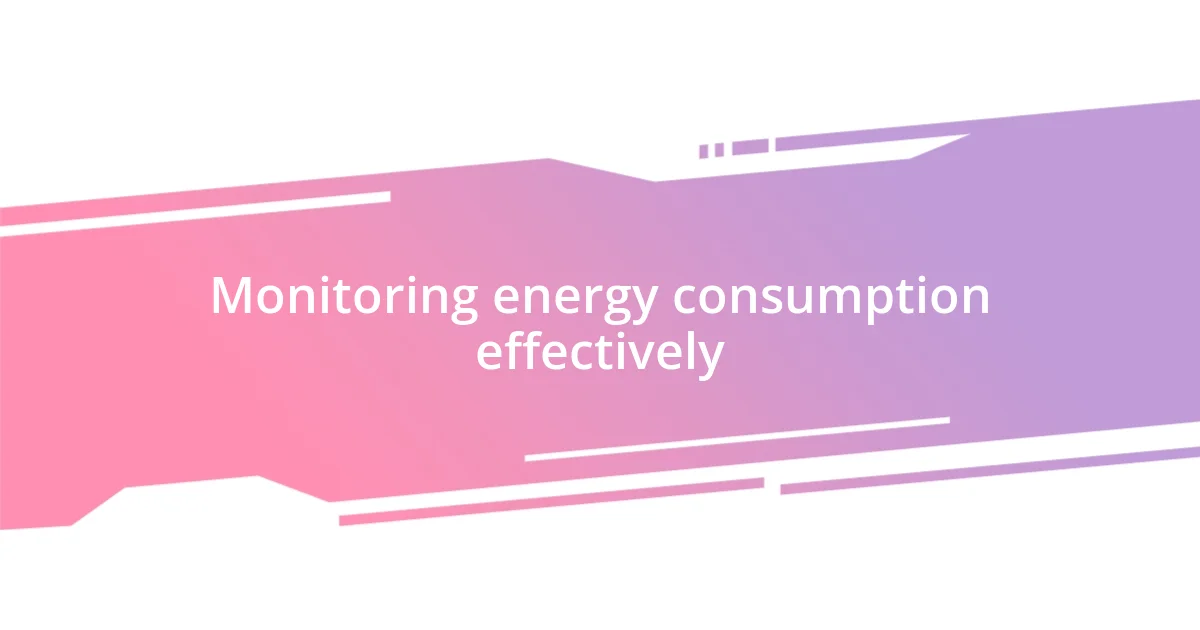
Monitoring energy consumption effectively
Monitoring energy consumption effectively requires a blend of smart technology and personal commitment. I remember the thrill of installing smart plugs around my home. They not only allowed me to track the energy usage of individual devices, but also gave me the ability to control them remotely. The first time I turned off an unused lamp from my phone while out with friends, I felt a sense of power over my consumption that I hadn’t experienced before. Isn’t it liberating to know you have a say in how much energy you’re actually using?
I’ve found that using energy monitoring apps can provide real-time insights into consumption habits, making it easier to pinpoint areas for improvement. When I first connected one to my home’s energy system, I was shocked to discover that my gaming console was a hefty energy consumer, even when it was in standby mode! Since then, I’ve become intentional about unplugging devices when they’re not in use. This small habit has led to noticeable changes in my energy bill and reinforces the idea that awareness drives action.
In my experience, engaging the whole household in monitoring energy consumption fosters a shared commitment to sustainability. I initiated a friendly competition with my family to see who could reduce their energy usage the most over a month. The competitive spirit motivated us to turn off lights, unplug chargers, and even reduce our water heater temperature. Watching our energy consumption drop felt rewarding, not just financially, but also as a shared achievement towards a more sustainable lifestyle. What better way to strengthen bonds than by working together for a common goal?












